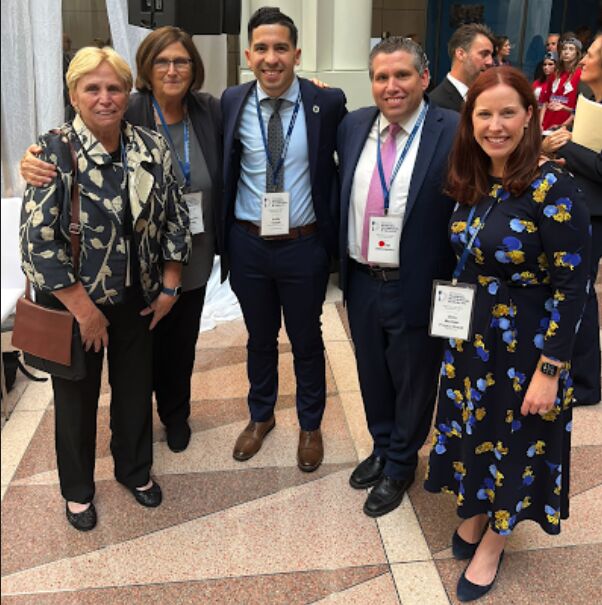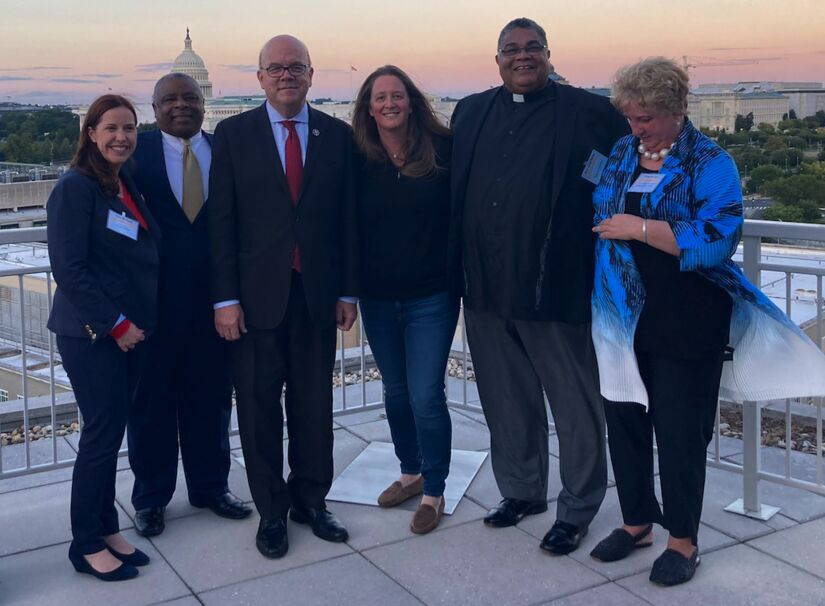Image


The number of Westwood residents enrolled in the Supplemental Nuitrition Assistance Program (SNAP, formerly known as food stamps) increased by 47.06 percent in the first year of the pandemic, from March 2020 to March 2021, reports Boston-based Project Bread, a nonprofit working to end hunger in Massachusetts. The second year of the pandemic, from March 2021 to March 2022, SNAP enrollment again increased among Westwood residents, this time by another 17.3 percent.
This data may be surprising to many. Westwood likely does not fit most people’s perception of the type of community in which residents may need assistance in fulfilling basic food needs. The town often pops up in lists of Massachusetts’s most expensive homes. Its taxpayers are able to support excellent public schools that include the number one ranked public elementary school in the state.
But Project Bread’s president and chief executive officer Erin McAleer knows better – not only from the vantage point of her current job but also from her experience as a child. She grew up in Massachusetts in a food insecure household.
"My mother divorced when I was five years-old, and quickly, it was just really challenging to pay all the bills. And food became the thing that she stressed about the most because it was the most basic of needs for her kids and she worried about how could she afford food. And what I remember from my childhood isn’t really a lot about food but more about just the stress in the household," she says.
Ms. McAleer now notes, “Food insecurity exists in every single community in the country, in every single zip code. You don’t know someone is food insecure by looking at them. When I’m faced with my own childhood, neighbors didn’t know, teachers didn’t know, family members didn’t know. Anyone who’s going through an economic crisis is likely struggling to afford food. So that economic crisis could be caused by a lost job, by health diagnosis, [ ] any of the things that could upset life. We all go through these times when something happens unexpected and we’re struggling to pay the bills.”
Westwood is certainly not alone in the state as a town with residents affected by food insecurity. According to data on Project Bread’s website, food insecurity was present in 15-16 percent of Massachusetts households with children in August 2021, and increased to 26.2 percent of households with children in August 2022. Last year in October, Project Bread announced that 1 in 5 Massachusetts households with children were food insecure. This October, the statistic for households with children that are food insecure is 1 in 4. The August 2022 data represents a new peak in food insecurity. It surpasses the previous pandemic peak that was set in May 2020.
“Right now, it’s getting worse, compared to last year for households with children,” says Ms. McAleer. She attributes the worsening situation to the economic fallout from the pandemic, inflation, and government assistance programs that have ended.
“The impact of inflation has certainly been huge. We’re hearing from folks every single day about the effect of inflation. But then also [ ] a lot of the government supports went away. . . . The [expanded] childcare tax credit was huge. There’s lots of research out there showing it both pulled people out of poverty, kept them out of poverty. And so when that program ended, that had major implications. But other programs have certainly ended over the course of this pandemic. [Massachusetts Pandemic] Unemployment assistance obviously ended and that was another really big one,” says Ms. McAleer.
In Westwood, Ms. McAleer notes, “There’s certainly families who need the support and are grateful for that Interfaith Walk for not just raising money, which is incredible . . . but also, I think just breaking the stigma. Just as a community coming together and saying, ‘We know this exists and we’re committed to addressing it,’” says Ms. McAleer, referencing Westwood’s upcoming Interfaith Mini-Walk for Hunger on October 23.
Since 2011, Westwood’s Temple Beth David and its congregants have organized the annual Interfaith Mini-Walk for Hunger, a fundraiser that benefits Project Bread in its mission to alleviate hunger in Massachusetts by providing food insecure residents access to food, with dignity.
“This walk is different. . . It began in 2011 as a mitzvah project for a Temple Beth David congregant and then it’s just grown every single year since then. . . . Unlike the Commonwealth program where organizations keep a big portion of the funds raised, for this walk, money raised is donated back to Project Bread,” she explains. “This one is really unique. It’s the only one that I know of that’s not in May and that is its own. So, yeah, I love walking in it. It’s a really wonderful community. It’s a great group of individuals. My kids have walked it with me. So it’s a lot of fun,” she says.
While Ms. McAleer and Project Bread have made their presence felt locally with the Interfaith Walk for Hunger and through their advocacy throughout the state, recently, the organization and its leader also had a chance to make national impact. After more than 50 years since the White House first (and last) saw a national conference on hunger, on September 28, 2022, President Biden hosted a White House Conference on Hunger, Nutrition and Health. Ms. McAleer attended as an invited guest.
The conference was intended to act as a catalyst to reach the Biden-Harris Administration's goal of ending hunger and diet-related disease by 2030. The Biden-Harris Administration adopted a National Strategy based on feedback from stakeholders like Project Bread, and included some of Project Bread’s recommendations.
 Photo courtesy of Project Bread. Right to left: Erin McAleer with MA Sen. Sal DiDomenico, MA Rep. Andy Vargas, Catherine D'Amato of Greater Boston Food Bank and another friend.
Photo courtesy of Project Bread. Right to left: Erin McAleer with MA Sen. Sal DiDomenico, MA Rep. Andy Vargas, Catherine D'Amato of Greater Boston Food Bank and another friend.A focus of the conference was innovative approaches that are working, that can be scaled. Project Bread lobbied for an invitation to the conference as an organization using innovative solutions that could be used as a model nationally, says Ms. McAleer. She remarks that Project Bread is the only comprehensive model in the country that addresses all barriers to accessing food, including helping food insecure people access transportation needed to go to the grocery store, obtain refrigerators to store food, and secure pots and pans on which to cook.
“I’m really proud of the model that Project Bread is leading on and I do genuinely believe it can serve as a national model,” she says.
One Project Bread recommendation that made it into the National Strategy is treating food insecurity as a part of health care. In a pilot program in the Commonwealth for low-income patients, Project Bread is working with partners Community Care Cooperative, Boston Children’s Hospital, and Boston Medical Center to provide comprehensive interventions that address social determinants of health that go beyond medical treatment. Under the pilot, Medicaid is paying for it all, she says. For example, the pilot participants hope to be able to show that providing healthy food to patients can prevent illness and thereby decrease healthcare costs.
 Photo courtesy of Project Bread. Erin McAleer (left) with Congressman Jim McGovern (third from left), whom she and other advocates credit for making possible the White House Conference on Hunger, Nutrition and Health.
Photo courtesy of Project Bread. Erin McAleer (left) with Congressman Jim McGovern (third from left), whom she and other advocates credit for making possible the White House Conference on Hunger, Nutrition and Health.Another Project Bread recommendation that the White House adopted, which is also a priority of Project Bread's to secure as a permanent benefit at state-level, is the call for free school meals for all students, regardless of income.
“Every single time school meals for all came up at the conference, there was like a standing ovation. . . There was universal support in that room,” says Ms. McAleer.
This year is the second year that Massachusetts is providing free school lunch to all students, under a second one-year extension. The state-funded program follows the end of two years of a federal pandemic program for providing free school lunches. Free school lunches for all is a solution to food insecurity among children because it gets rid of stigma that some students feel in accepting free lunches.
“I mean, there’s no stigma with library books, right? Because every kid gets a free library book. There’s no stigma with visits to the nurse’s office because we don’t say, ‘Well, you have to pay the full price of the bandaid for your bloody knee, but he only needs to pay a reduced price, but she’s going to get it for free.’ So this [school lunches] is the one thing we’re means-testing kids for, and they know it. And so it perpetuates stigma,” explains Ms. McAleer.
How close are we to making school lunches free in Massachusetts, permanently? “That’s a million dollar question,” says Ms. McAleer. She notes that there is momentum now, following the White House conference. However, public awareness is a challenge to this and other agenda items regarding solving food insecurity.
Ms. McAleer observes that many parents are not aware that advocacy is a reason why Massachusetts students have the benefit of free lunches, and similarly, many parents don't know that this benefit will expire without further advocacy. Parents aren't thinking about the politics behind why their children get free lunch at school this year. They just know that their child will be fed at school, says Ms. McAleer. She wants parents and school leaders to call legislators to emphasize how valuable this benefit is. She believes elected officials could be persuaded by their constituents to make free school lunches permanent and a part of the normal, school experience.
"The Legislature, I think, is committed. They included it again in this year’s budget, but they have a lot of competing priorities. So, it's on us to make sure that they hear from their constituents that this is a top priority," says Ms. McAleer.
If you are experiencing food insecurity, you can speak to a counselor at Project Bread’s free and confidential food assistance hotline: 800-645-8333. Learn how Project Bread can help by visiting projectbread.org.
Thanks to Erin McAleer and Project Bread for speaking with Westwood Minute and contributing information for this article.
Updated 10/5/2022 at 2:45 p.m. The top photo to this article initially misidentified a person as former Massachusetts Governor Deval Patrick, in whose administration Erin McAleer previously served. The person in the photo is U.S. Senator Cory Booker. Westwood Minute apologizes for the error.